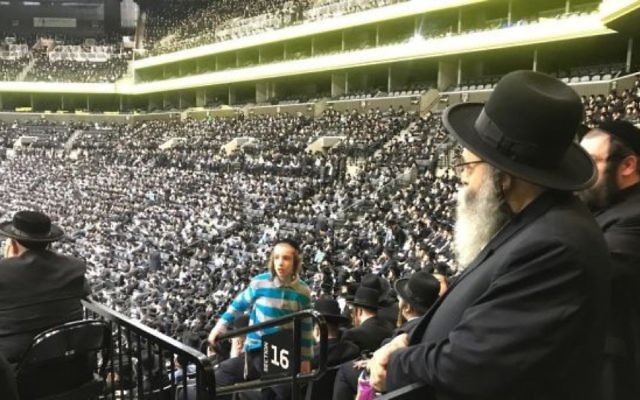Brooklyn Protest Reflects Israel-Haredi Tensions
Ultra-Orthodox groups have outspokenly opposed a Jewish state in the land of Israel, despite living there.
Nearly 20,000 ultra-Orthodox men and boys gathered at Barclays Center in Brooklyn on Sunday, June 11, to demonstrate against the Israeli government’s enforcement of laws requiring young Hasidic Israeli men to enlist in the Israel Defense Forces.
The event, conducted primarily in Yiddish, reflected longstanding tensions between the Israeli government and certain ultra-Orthodox communities in the United States and Israel. Theology and law lie at the center of the conflicts.
Dating back to the establishment of Zionism, many ultra-Orthodox groups have outspokenly opposed a Jewish state in the land of Israel. Holding the belief that a Jewish state cannot legitimately exist until the arrival of the Messiah, these groups, despite having a significant demographic presence in Israel, continually clash with the Israeli government over issues of state power.
The struggle for military exemptions for Haredi yeshiva students, a legal process that began in 1982 with a series of petitions from the Haredi community, is at the center of this tension.
While service in the Israeli military is mandatory for all Israeli citizens at age 18, a temporary series of conscription exemptions had been instituted for ultra-Orthodox yeshiva students.
Seen as an interim solution to the longstanding issue, the Tal Law, based on the recommendations of the Tal Commission, stipulated in 2002 that yeshiva students, at the age of 22, could choose between a year of unpaid, nonmilitary national service or a 16-month reduced term of military service after their religious studies.
The law, which proved ineffective at raising Haredi conscription rates, was ruled unconstitutional and subsequently revoked in 2012.
Since then, the Israeli government has taken numerous measures to enforce mandatory conscription among young Haredi men. Despite modestly increasing numbers, Haredi soldiers often face ridicule and abuse within their communities.
A slowly growing minority in that community sees Israeli military service as a means of achieving upward mobility and escaping the rampant poverty associated with the Haredi neighborhoods in Israel, but that is not a widespread phenomenon.
Despite many Haredi Jews in Israel and the United States refusing to acknowledge the legitimacy of Israel or its government, their community is a part of the state and accordingly will need to figure out some way of reconciling theology with citizenship and the associated civic responsibilities.
Eli Sperling is the Israel specialist and assistant program coordinator for the Center for Israel Education (www.israeled.org).
For Further Reading




comments